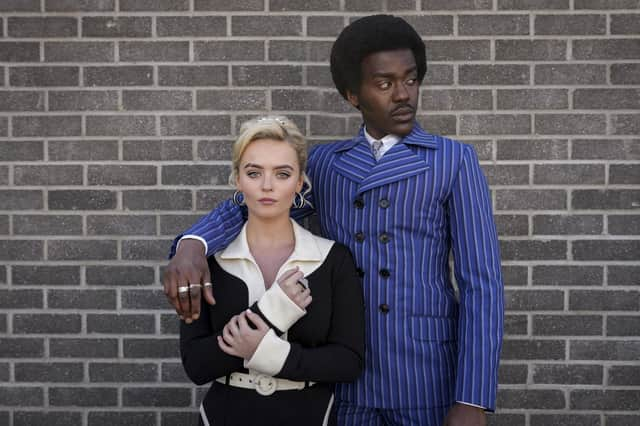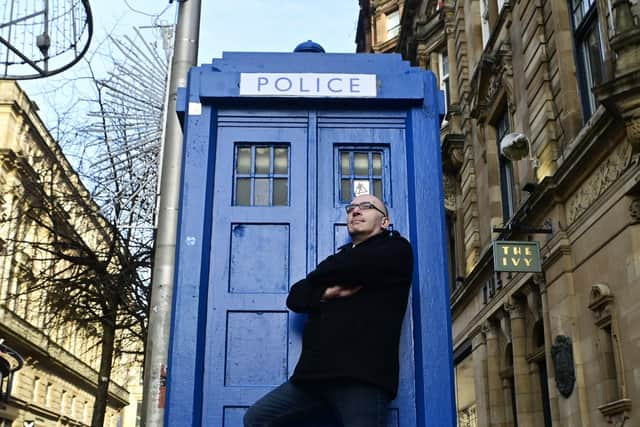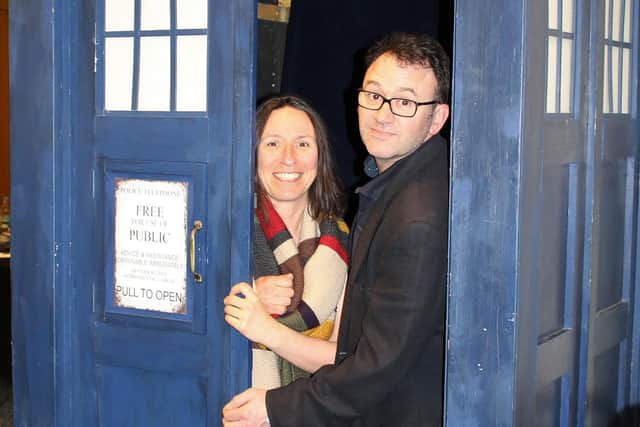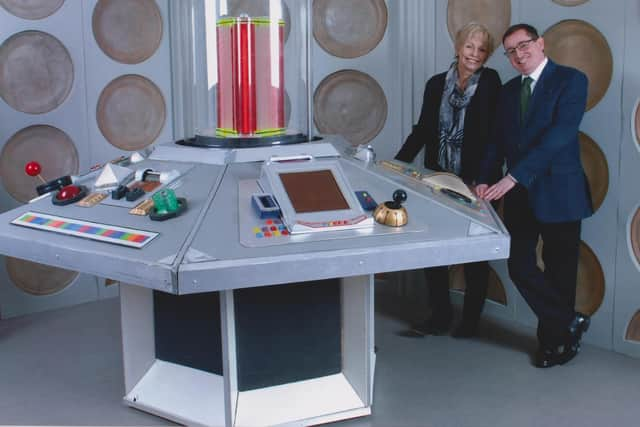'Once something like Doctor Who is in your heart it stays there'


There’s no point being grown up if you can’t be childish sometimes.” A wise man once said that and I’m remembering the words as my train slows to a halt in Glasgow.
The quote belongs to Doctor Who and what is Glasgow if not the centre of the Whoniverse? Nowhere else can match its credentials with Peter Capaldi, the 12th incarnation, having been born in the city and Sylvester McCoy, the 7th, hailing from Dunoon, just a bit further west. David Tennant, the tenth and also the 14th, grew up in the posh part of Paisley, eight miles being nothing in the space-time continuum. And the 15th, Ncuti Gatwa, trained to be an actor right here after the kind of ambling journey – Rwanda, Edinburgh’s Oxgangs scheme, the royal burgh of Dunfermline – suggestive of the Tardis in Sunday-driving mode with a defective booster.
Advertisement
Hide AdAh, the Tardis. Whatever happened to the big, beautiful blue box – big on the inside at least – of my telly-worshipping childhood? Why, instead of trains which slow to a halt, am I not whooshing across the stratosphere, living on Mars and holidaying on Jupiter or even more exotic planets? What happened to the infinite possibilities advertised by Doctor Who for we Space Race kids? The show cannot be blamed for them not coming true, although the fact they didn’t probably caused me to give up on it. So, can a visit to Glasgow revive my sense of wonderment in time for the latest regeneration on BBC1 on Christmas Day?


I am not here to meet any of the Doctors, now too famous to be hanging around Queen Street station helpfully bearing a copy of The Scotsman, but rather some fans who’ve stayed loyal all the way to the 60th anniversary year and still love it. And, I must confess, I think I’m going to be spending the day with some childish men.
Nerdy nutters in black T-shirts with favourite monsters front and back gabbing excitedly about old episodes, quoting dialogue, arguing about sub-text and modern-day prescience and out-obscuring each other on tiny Time Lord detail as they threaten to self-combust like Daleks trapped in a ball bearing factory.
But of course John Hughes, newspaper in hand, is nothing like this. In his smart suit and tie he looks like he works in a bank because that is what he does. He’s taken a couple of hours off work to meet me and insists on buying lunch where he begins with his most cherished Who fact: “I was born on 15 February, 1974 which was the day Tom Baker was unveiled as the fourth Doctor. Or Mr Baker as I prefer to call him.”
Hughes has met Mr Baker and many of the other Doctors including Capaldi (“I wish it was still him”), Colin Baker (“The loveliest, loveliest man”) and Peter Davison, his goggle-eyed introduction to the show at the age of eight. He’s very respectful of the acting profession, not just addressing all the veteran, classic-era Doctors as “Mr” but checking himself right after describing some of the companions as friends (“Maybe I’m being too forward”) and there’s also a reluctance to name his all-time No 1: “Please don’t ask my to use the f-word for favourite.” In the photos he shows me from fan conventions smiling alongside the stars, he’s permanently suited, again out of courtesy. So what’s the weirdest item he’s ever seen on a memorabilia stall? “Oh, that would be boys’ Y-fronts with Mr Baker’s face on the front. You couldn’t get away with that sort of thing now.”


It was his mum who got him into the show. Hughes has a congenital heart condition and as a boy found an affinity with the Doctor who has two hearts. Maybe this emboldened the lad for the show never scared him. Davison was like “a fun big brother although I should say I do have an older brother and he’s wonderful”.
Advertisement
Hide AdAt school he couldn’t find a Who chum with whom he could share his sci-fi passion. “But that was okay. I liked that I was the only Doctor Who fan, or at least the only one who admitted to it because I’m sure some of the other kids must have watched. They were like ‘That’s John’s thing’ and I never got teased. If I was, mind you, I’d like to think I would have had a good comeback because the Doctor teaches you how to defend yourself with words.”
There’s no shortage of like-minded folk at the conventions although Hughes doesn’t always make connections. “I must be careful how I say this but some fans don’t socialise terribly well. Maybe they were ostracised when they were younger, possibly because they weren’t good at sports, and they found a friend in the Doctor.
Advertisement
Hide Ad“They might be into cosplay and dress up as their favourite characters, which I don’t do, and some will only have one line of conversation. I’ll try and talk about other things but, bless them, their sole focus will be the show. And really that’s okay.”


Because Hughes is a devotee too. “Fan love is different from normal love,” he says. “In real life, unfortunately, we get old, put on weight, lose some hair. But if you’re lucky enough to meet one of the Doctors, Mr Baker or whoever, you remember them exactly as they were.”
I’m not going to ask him to use the f-word but surely there must have been some adventures which failed to thrill? “There’s no such thing as a bad episode of Doctor Who. I love some slightly more than others but can always enjoy a guest appearance or a witty line.” If there’s nothing on TV he’ll dig out Tom Baker in “City of Death” or Jon Pertwee in “Earthshock” or a yarn featuring Nicola Bryant as the glamorous Peri. Despite efforts to sex it up, the show was axed in 1989. “[BBC1 Controller Michael Grade] hated it,” admits Hughes.” The Tardis was fired into a black hole. In the 1990s the show was “the love that dared not speak its name”. And then out of nowhere – actually, out of the head of Russell T. Davies, a disciple from the moment William Hartnell transmogrified into Patrick Troughton who became showrunner – the wonderful woo-hooing theme music signalled 2005’s revival.
Hughes says he’s as excited for the introduction of Gatwa as his eight-year-old self had been for a second appointment with Davison, seven interminably long days after the first. “Once something like Doctor Who is in your heart it stays there.”
As he heads back to the bank he makes a promise: to identify the episode that terrified me when I was eight. I’ve given him the flimsiest of detail – Troughton era, contemporary Britain as was, panic on the streets, policemen rushing – but he’s confident of being able to track it down. Then with a chuckle he bids farewell: “Am I the geek I didn’t want to be today?”
Now I’m standing outside an old police box in Glasgow’s Buchanan Street and remembering all the childhood fantasies inspired by the one at the end of my road. Thirty years ago Kenny Smith helped save six of them for the city when they were about to be demolished. He’s another Who fan, a child of the Tom Baker era, a former Who fanzine editor who now hosts the Who podcast The Power of 3. Just don’t call him a Whovian, the US-originated term. “It’s ugly with none of the show’s wit,” he says. “Frankly, I’d be less offended if you called me a c***.”
Advertisement
Hide AdI’m not about to do that. Like Hughes, his exuberance for the show is infectious. Glasgow’s Tardises (Tardisi?) were rescued during Doctor Who’s wilderness years. The fanzine was written then. And, once a week in a pub basement, Smith continued to keep the flame burning along with 20 other lost, but not defeated, souls in what was nothing if not a prototype book group.
He says: “The only access to new Doctor Who stories was through these novelisations. We got together via shop fliers and – would you believe it? – old-fashioned letter-writing. Then every Monday night in [Edinburgh’s] Queen’s Arms we’d discuss the books. Great friendships were formed, analytical skills were developed and it was all wonderfully social. We listened to opinions, considered them and discussed. Quite a contrast compared to what happens on the internet now: everyone shouting over the top of each other in capital letters. I got a lot out of these sessions and the books taught me about grammar, spelling and sentence structure – pretty important for a cub reporter on a weekly paper.”
Advertisement
Hide AdNow an NHS communications officer, Smith started the obsession early, aged just four. He doesn’t only remember whole episodes verbatim, but where he was when he missed cliffhanger instalments: on a caravan holiday, no VHS recorder, during “Battlefield” and for “Remembrance of the Daleks”, cheering on Aberdeen FC. “Doctor Who is big in my life but I’m not defined by it,” he insists, and the fact he supports a football team backs that up. As indeed does the fact he has a wife. So do they watch together? “No, Jen hates it, as does my daughter Katy, even though we named her after Katy Manning [ex-companion Jo Grant].”
In recent times Doctor Who has been confronted by dastardly foes of a different sort: Beeb-bashers and in particular the rebel breakaway hardline anti-wokery faction. The show has been criticised for being too PC, too preachy, too issue-driven, too right on, too hung up on sexual politics. Smith simply laughs. “It’s always moved with the times, often been ahead of them, and has never shied away from taking on issues. There’s been lots about the harm being caused to the planet, the Cybermen were born out of fears about how far spare-part surgery might go and ‘The Happiness Patrol’ parodied Margaret Thatcher. The BBC are constantly being attacked and right now woke is so weaponised. Some people are desperate to be offended but I love Doctor Who being controversial and provocative. Carry on complaining!”
At difficult moments in Smith’s life, the show has been there for him, such as the deaths of his parents. “I was bereft and didn’t know what to do so I dug out an old DVD: ‘The Five Doctors’, which was the 20th anniversary special. It took me back to watching with Mum and Dad and lifted my spirits. It’s become my comfort blanket.”
Russell T Davies reckons the secret of Who-love exists in what the Doctor is not: he – or sometimes she or indeed they – don’t have to do boring old homework or go to boring old work. Andrew Duncan’s job as a civil servant causes us to have to relocate our chat to Zoom and from the books on the shelf behind him – biographies of John Peel and Robert Wyatt, giants of alternative music – it’s obvious he’s not a monomaniac either. But there’s little doubt of the impact the show has had on him.
The boy who encouraged him to brave it – in the face of taunts from other kids at his school who knew he was scared and so exaggerated the horrors of Zarbis and giant maggots – is his best pal today. “Who would have thought that 50 years later we’d still be messaging each other about it?” says Duncan. The other day the friend, Jeremy Donald, sent him a photo from the latter’s eighth birthday party when the games stopped for the latest instalment. “We both remembered what it was – ‘Planet of Evil’, episode three.
“During the 1970s Doctor Who was absolutely my favourite thing in the world. The whole school loved it and on Thursdays everyone would rush out to buy the spin-off magazine. By the age of 14, some, trying to be cool, would claim to have grown out of it. But that was the year Adric, one of the companions, was killed off and it was obvious from the shock that caused that we were all still watching. The same thing happened at university, students trying to be really sophisticated, and suddenly the chat coming round to the Daleks and an episode where they levitated. Still watching!”
Advertisement
Hide AdBut for Duncan the Time Lord’s most dramatic intervention was yet to come. While working as the night manager of a Glasgow hotel he suffered a breakdown and had to quit the job. “This was February 2005, a month before Doctor Who was coming back. I remember my dad – who’d always moaned about the show obsessing me and causing my school work to suffer – saying: ‘What if it’s no good?’ But I didn’t dare think about that. The revival gave me hope while I got myself better.
“By then we had the internet which gave rise to Doctor Who chatrooms. I couldn’t quite believe there were so many fans out there and that’s how I met my wife. We were using pseudonyms and little cartoon avatars. Anne-Marie was ‘AM in Space’ and I was ‘No touch, Pod’ which is a line from ‘Seeds of Doom’. It’s spoken to a character called Dunbar, which was Anne-Marie’s maiden name.” The seeds of a romance were planted and not long after daughter Heidi arrived. “The first Doctor Who baby for our forum. There have been a few more since. Would I say the show saved my life? Before meeting Ann-Marie I was a single man who hadn’t been looking after myself for years and years, so yes.”
Advertisement
Hide AdWhat a cheering tale. And just who are these Doctor Who deniers and what is their problem exactly? Like John Hughes, both Andrew Duncan and Kenny Smith can’t wait for the 15th incarnation. So he’s black, so he’s gay – so what? “I’m fascinated that this will be the first Doctor with a moustache,” laughs Duncan, sending up the hoo-ha surrounding Ncuti Gatwa.
Smith adds: “It’s brilliant. He’s got so much warmth, charisma, talent and fun about him. And what a beautiful voice with that amazing Scottish-Rwandan accent. This is going to make him a superstar.”
Right … when’s it on?
Doctor Who, BBC1, Christmas Day, 5.55pm
Comments
Want to join the conversation? Please or to comment on this article.